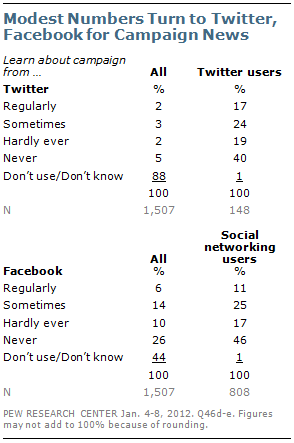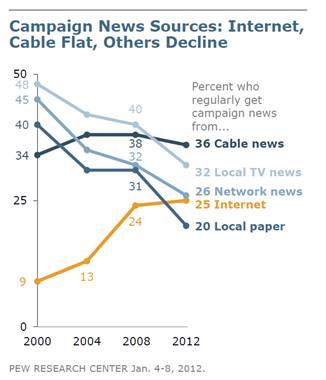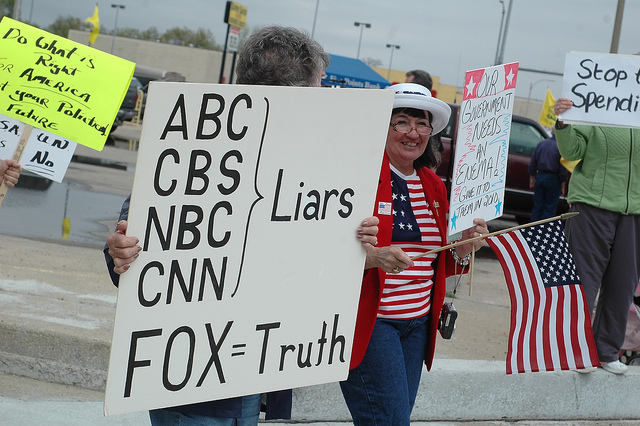Many of you are, like me, among the proverbial “99%” when it comes to economics and income. But if you regularly learn about the 2012 campaign from those you follow on Twitter, as I do, you’re in an elite class of a different sort.
A new report out from the The Pew Research Center for The People and The Press contains some interesting findings about the media outlets citizens are using to inform themselves about the presidential campaign.
Here are a few of the more surprising findings.
New Media: Not So Much
According to the study, while this is the first campaign in which the Internet has surpassed local newspapers as a primary source of political news, social-networking sites are largely exempt from this trend.
Very few Americans regularly get campaign news from social-networking sites like Facebook and Twitter (6% and 2%, respectively). Even among people who report using these social networks, nearly half (46%) say they “never” learn about the election there. At first, these findings seem to fly in the face of the current craze around word-of-mouth or peer-to-peer campaign tactics. But when you consider the apparent influence of offline social networks (you know, friends and family and other relationships that transcend cyberspace), these types of grassroots approaches are doubtless effective.

Cable rules
The study also shows that for the first time, more Americans regularly get campaign news from cable news outlets like Fox News and MSNBC than from their local television stations. This makes cable news the most popular destination for regular political news. Given the frequency and intensity of these channels’ political coverage, this may not be surprising. It may also not be surprising to learn that Republicans are much more likely than Democrats to tune into Fox News and Democrats are much more likely than Republicans to turn to CNN and MSNBC.
What does this all mean for the prospect of continued polarization in this country? What do we get when the increasing influence of cable news channels on the national debate mixes with the increasing partisanship of those channels’ audiences — and when more people are getting campaign news from the Internet (where, presumably, they can pick political news sites that align with their political disposition) than the local paper, magazine or radio station?
Moreover, what does it mean when the audience group that most commonly reported that they “enjoy political news a lot” (people who agree with the Tea Party) are also most likely (at 74%) to report that they see the news media as biased?
I spoke with Carroll Doherty, the associate director of the Pew Research Center for The People and The Press, who observed that Tea Party Republicans who reported seeing bias aren’t thinking about Fox News, but about other media channels they’re less likely to watch. My psychologist friends might chalk this up to a classic case of actor-observer bias, but no matter.

What? Mitt Romney is a Governor?
If it is the media’s job, collectively, to educate voters about the candidates, their policies and issues, they’re not doing a very good job of it. The report finds that the “general public’s knowledge about some of the fundamentals of the major candidates’ resumes, positions and the campaign process is rather limited … 58% were able to identify Newt Gingrich as the candidate who had been speaker of the U.S. House of Representatives. Fewer than half (46%) knew that Mitt Romney was governor of Massachusetts, and just 37% could identify Ron Paul as the Republican candidate opposed to U.S. military involvement in Afghanistan.”
This begs the question: If the various media aren’t effectively educating the voters, perhaps we can find ways of educating ourselves — and maybe we could start by using Twitter and Facebook?
Mark Hannah is the political contributor for MediaShift. Mark’s political career began on the Kerry-Edwards presidential campaign, where he worked as a member of the national advance staff. He’s more recently done advance work for the Obama-Biden campaign, the Presidential Inaugural Committee and the White House. In the “off-season” (i.e., in between campaigns) he worked in the PR agency world and conducted sensitive public affairs campaigns for well-known multinational corporations, major industry organizations and influential non-profits. He serves on the board of directors of the National Association for Media Literacy Education, is a member of the Public Relations Society of America and was a research fellow at the Society for New Communications Research. He is a graduate of the Annenberg School for Communication at the University of Pennsylvania and received a master’s degree from Columbia University. His personal website is www.mark-hannah.com, and he can be reached at markphannah[at]gmail.com. Follow Mark on Twitter: @MarksTerritory

